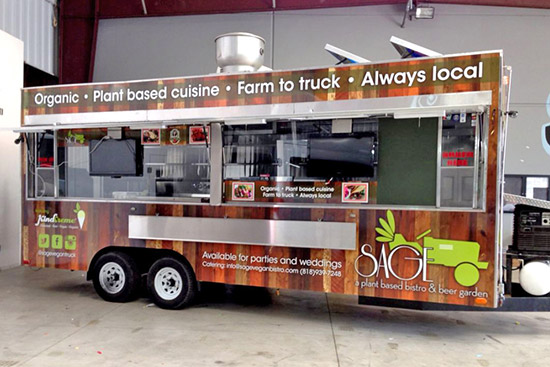The Los Angeles City Council amended a municipal ordinance Tuesday to crack down on food trucks and their operators who regularly park illegally in residential areas and “eat” the cost of the parking ticket as part their overhead.
Food trucks are allowed to park in residential neighborhoods for up to 30 minutes, but city law only allows one ticket to be issued per day for a violation.
The amended ordinance — which only applies to food trucks and requires Mayor Eric Garcetti’s signature to become law — would create escalated penalties for each 30-minute increment during a parking violation in a residential area. The amendment was approved with a 14-0 vote.
“The current ordinance is as a single ticket, and folks sort of incorporate it as a cost of doing business,” Councilman Mike Bonin said. “This adds a tiered fine structure so that if you don’t move after getting a ticket after 30 minutes, you can get a second and then you can get a third.”
The motion to amend the ordinance sailed through the Transportation Committee earlier this year, but was delayed for a vote by the full council several times as the city addressed objections raised by the Southern California Mobile Food Vendors Association.
At a Transportation Committee meeting on Aug. 9, Bonin said the amendment had been refined slightly since it was initially approved in the spring to clarify the definition of a residential street and block and specify how far a truck would have to move to avoid receiving another ticket, which is a half-mile. Bonin chairs the Transportation Committee and also introduced the motion calling for the amendment.
Matt Geller, CEO of the Southern California Mobile Food Vendors Association, said his organization still objects to the amendment and plans to file a lawsuit challenging it. He said he has been raising concerns with the city and Bonin’s office for months but has been largely ignored.
“They just didn’t care about anything regarding input,” Geller told City News Service. “They don’t return my phone calls. They don’t return emails. Nothing.”
Bonin said the idea for the ordinance grew out of complaints that food truck operators in the Brentwood area were illegally parking and refusing to move. The trucks were becoming a safety hazard in some areas, including the intersection of Bundy Drive and Shetland Lane, where several serious auto collisions have occurred, he said.
In June, Geller pointed out that the existing ordinance the council is seeking to amend was declared unconstitutional by a Superior Court judge in 2009, and the same year, then-LAPD Chief William Bratton sent out a memo telling officers not to enforce the ordinance due to the court’s ruling.
A spokesman for Bonin’s office did not return a call seeking comment, but Geller said because the original ordinance was being altered he was told the city believes it is no longer the same ordinance that was declared unconstitutional.
Geller also said the amended ordinance does not address the issue of public safety, because it would not prevent another food truck from immediately taking another’s place for 30 minutes, or for a delivery truck or an RV from parking in the same place and receiving escalating tickets, so the safety hazard could remain.
“If there’s an actual public safety concern on sight lines, then there is an actual public safety concern on Fed Ex trucks as well. Or on giant vehicles,” Geller said. “And if that spot is as good as they say, then as soon as a truck moves another one is just going to pop into its place. Now instead of one truck for four hours, you’re going to have four to eight trucks for four hours. If it’s a public safety concern, then why are you OK with it being unsafe for 30 minutes?”
Geller also said his organization was in favor of an ordinance that just addressed the problem area in Brentwood or that imposed height regulations on trucks in residential neighborhoods.
“This is a group of West L.A. residents that are going to dictate food truck policy across the city. It’s just these two trucks (in Brentwood), and I wish I could tell those two trucks to get lost. They’ve been talked to and they just don’t care,” Geller said. “And that’s very, very frustrating, but it’s also not fair to communities that rely on food trucks for a night out to dinner.”












